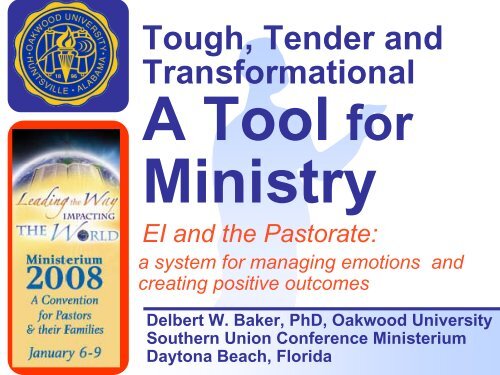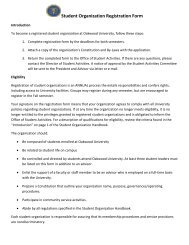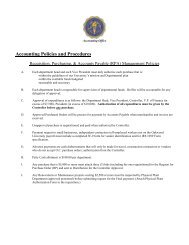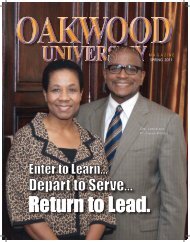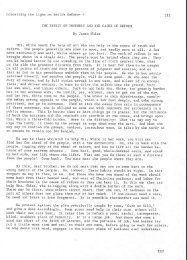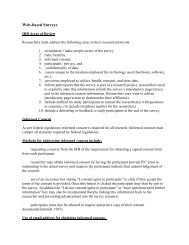Emotional Intelligence & the Pastorate: "A Tool for Ministry"
Emotional Intelligence & the Pastorate: "A Tool for Ministry"
Emotional Intelligence & the Pastorate: "A Tool for Ministry"
You also want an ePaper? Increase the reach of your titles
YUMPU automatically turns print PDFs into web optimized ePapers that Google loves.
Tough, Tender and<br />
Trans<strong>for</strong>mational<br />
A <strong>Tool</strong> <strong>for</strong><br />
Ministry<br />
EI and <strong>the</strong> <strong>Pastorate</strong>:<br />
a system <strong>for</strong> managing emotions and<br />
creating positive outcomes<br />
Delbert W. Baker, PhD, Oakwood University<br />
Sou<strong>the</strong>rn Union Conference Ministerium<br />
Daytona Beach, Florida
Past<br />
and<br />
Present
Ministerial<br />
Context
Pastors in Transition: Why Clergy<br />
Leave Local Church Ministry<br />
by Dean Hoge and Jacqueline Wenger<br />
Wm B Eerdman’s Pub Co: Grand Rapids, MI, © 2005<br />
The most prevalent reason clergy leave local<br />
church ministry is moving on to ano<strong>the</strong>r kind of<br />
ministry. Joy and optimism often accompany<br />
<strong>the</strong> minister through this vocational change.<br />
The next three most prevalent reasons <strong>for</strong><br />
leaving are polar opposite experiences: 1)<br />
leaving due to conflict in <strong>the</strong> congregation, 2)<br />
due to burnout, or 3) due to conflict with one’s<br />
denomination. Hoge and Wenger describe<br />
more fully each of <strong>the</strong>se leavings.
Conflict in <strong>the</strong> congregation most often<br />
revolves around finances, leadership style,<br />
changes in worship style, renovation<br />
issues, and staff conflicts.<br />
These are listed in descending order <strong>for</strong> frequency. The<br />
researchers discovered two recurrent <strong>the</strong>mes in congregation<br />
conflicts leading to clergy leaving.<br />
*First, even churches who say <strong>the</strong>y want to grow are often<br />
unwilling to tolerate <strong>the</strong> changes necessary to do so.<br />
*Second, when conflict is present in <strong>the</strong> congregations, a<br />
pervasive assumption exists that this must be (at least partly)<br />
<strong>the</strong> pastor’s fault.<br />
Wise clergy stay aware of <strong>the</strong>se two dynamics as <strong>the</strong>y interact<br />
with <strong>the</strong> congregational system.
Never, ever think<br />
outside <strong>the</strong> box!
Outside-<strong>the</strong>-Box
Three Objectives<br />
1. Demonstrate how EI is an effective tool <strong>for</strong><br />
<strong>the</strong> Minister who wants to be effective.<br />
2. Provide an overview of EI from <strong>the</strong> Bible and<br />
Spirit of Prophecy.<br />
3. Create motivation <strong>for</strong> <strong>the</strong> use EI principles.<br />
Overall Objective: Show that EI facilitates a<br />
successful Christ-centered ministry.
Emotions
Identify<br />
emotions
YOUR GREATEST . . .<br />
<strong>Emotional</strong> HOT BUTTON<br />
-What ticks you off <strong>the</strong><br />
most<br />
-What tempts you to lose<br />
it
The Pastor’s Need<br />
and <strong>the</strong> Greatest of<br />
Gifts . . .
The Pastor Alpha’s saga<br />
Pastor Alpha is educated, knowledgeable, impressive<br />
looking , with an ideal spouse.<br />
He seems like <strong>the</strong> ideal pastor with great potential.<br />
Un<strong>for</strong>tunately, his ministry is experiencing problems and<br />
is showing tale-tell danger signs.<br />
Pastor Alpha’s problem: He is running into people<br />
problems because he lacks <strong>the</strong> emotional skills<br />
necessary to relate successfully to o<strong>the</strong>rs.<br />
(Even if not this extreme, everyone can increase <strong>the</strong>ir EI<br />
and experience improvement in <strong>the</strong>ir relationships.)
Challenge<br />
“Our greatest duty to<br />
God and man is<br />
that of self-improvement.”<br />
Ellen White
<strong>Emotional</strong> <strong>Intelligence</strong><br />
and Ministry<br />
There is hope <strong>for</strong> anyone having <strong>the</strong> Pastor Alpha<br />
Syndrome! And <strong>for</strong> those who want to increase <strong>the</strong>ir<br />
ability to relate to o<strong>the</strong>rs successfully.<br />
Integrating emotional intelligence (EI) principles in your<br />
ministry in <strong>the</strong> context of Bible and Spirit of Prophecy<br />
principles can facilitate trans<strong>for</strong>mation in <strong>the</strong> life of <strong>the</strong><br />
Pastor and Christian worker.<br />
So EI is a tool that, with <strong>the</strong> help of <strong>the</strong> Holy Spirit, will<br />
give you a handle on how to discover what you are doing<br />
right and what you need to improve.
Skills expected in ministry<br />
Biblical knowledge<br />
Leadership ability<br />
Communication expertise<br />
Spiritual <strong>for</strong>mation proficiency<br />
Professional ethics<br />
Preaching & teaching<br />
Management (i.e., financial)<br />
Evangelism (soul-winning)<br />
Church growth principles<br />
Denominational polity<br />
These traits are often termed pastoral hard skills.
Skills expected in ministry<br />
Interpersonal skills<br />
Helping<br />
Personal humility<br />
Conducive environment<br />
Diversity sensitivity<br />
Ability to motivate<br />
Conflict management<br />
Fruits of <strong>the</strong> Spirit<br />
Loving service<br />
Lay empowerment<br />
These traits are often termed soft skills.
EQ and IQ<br />
Compared<br />
How well you use<br />
intelligence<br />
Defines how intelligent you are<br />
Gets you promoted<br />
Gets you hired<br />
Can develop and increase<br />
Essentially is <strong>the</strong> same from<br />
birth
A Biblical Perspective of<br />
EI
<strong>Emotional</strong> <strong>Intelligence</strong> (EI)<br />
Definition—”<strong>the</strong> capacity to recognize and manage our own<br />
feelings and to respond to <strong>the</strong> feelings of o<strong>the</strong>rs in such a<br />
manner as to create positive outcomes.”<br />
Few skills are as important to a Christian worker as <strong>the</strong><br />
spiritually based ability to understand and relate to one’s own<br />
emotions and <strong>the</strong> emotions of o<strong>the</strong>rs.<br />
Pastor Alpha lacks emotional intelligence.
<strong>Emotional</strong> <strong>Intelligence</strong> (EI)<br />
“We are judged by a new yardstick: not just by how smart we<br />
are, or by our training and expertise, but also by how well we<br />
handle ourselves and each o<strong>the</strong>r.”<br />
Daniel Goleman, author of Working with<br />
<strong>Emotional</strong> <strong>Intelligence</strong> and Primal Leadership<br />
Having emotional intelligence is twice as<br />
important <strong>for</strong> leadership per<strong>for</strong>mance as having<br />
IQ and technical skills combined.
Universal and Timeless Principles
Biblical and Spirit of<br />
Prophecy Basis <strong>for</strong> EI<br />
Ministry is about people.<br />
Loving and relating to diverse people is at <strong>the</strong><br />
heart of an effective ministry.<br />
The ministry of Jesus—<strong>the</strong> true model of<br />
leadership—was intertwined with people.<br />
• “He who seeks to trans<strong>for</strong>m humanity must himself<br />
understand humanity. Only through sympathy, faith,<br />
and love can men be reached and uplifted.” (EG<br />
White)<br />
Crucial: Knowledge, abilities, and skills are<br />
important, but <strong>the</strong>y can’t be separated from <strong>the</strong><br />
centrality of sound emotional intelligence.
Biblical and Spirit of<br />
Prophecy Basis <strong>for</strong> EI<br />
Paul highlighted <strong>the</strong> importance of <strong>the</strong> leader’s<br />
emotional intelligence.<br />
• “But <strong>the</strong> fruit of <strong>the</strong> Spirit is love, joy, peace,<br />
patience, kindness, goodness, faithfulness,<br />
gentleness and self-control. Against such things<br />
<strong>the</strong>re is no law. Those who belong to Christ Jesus<br />
have crucified <strong>the</strong> sinful nature with its passions and<br />
desires. Since we live by <strong>the</strong> Spirit, let us keep in<br />
step with <strong>the</strong> Spirit.” (Gal. 5:22-25, NIV)<br />
Crucial: <strong>Emotional</strong> intelligence originates with <strong>the</strong> Holy<br />
Spirit but needs to be cultivated and nurtured in <strong>the</strong> life of<br />
<strong>the</strong> believer.
Biblical and Spirit of<br />
Prophecy Basis <strong>for</strong> EI<br />
Paul also identified emotionally unintelligent<br />
qualities.<br />
• “The acts of <strong>the</strong> sinful nature are obvious: sexual<br />
immorality, impurity and debauchery; idolatry and<br />
witchcraft; hatred, discord, jealousy, fits of rage,<br />
selfish ambition, dissensions, factions and envy;<br />
drunkenness, orgies, and <strong>the</strong> like. I warn you, as I<br />
did be<strong>for</strong>e, that those who live like this will not<br />
inherit <strong>the</strong> kingdom of God.” (Gal. 5:19-21, NIV)<br />
Crucial: These are emotions and actions that<br />
need to be avoided.
Biblical and Spirit of<br />
Prophecy Basis <strong>for</strong> EI<br />
O<strong>the</strong>r biblical counsel:<br />
• Peter’s principles of spiritual development: Bro<strong>the</strong>rly<br />
kindness and love are at <strong>the</strong> top. (2 Peter 1:3-10)<br />
• Paul prioritizes love above all else (1 Cor. 13)<br />
• “Finally, bro<strong>the</strong>rs, whatever is true, whatever is noble,<br />
whatever is right, whatever is pure, whatever is lovely,<br />
whatever is admirable—if anything is excellent or<br />
praiseworthy—think about such things. Whatever you<br />
have learned or received or heard from me, or seen in<br />
me—put it into practice. And <strong>the</strong> God of peace will be with<br />
you.” (Philippians 4:8, NIV)<br />
Crucial: Next to loving God, loving and relating<br />
au<strong>the</strong>ntically and sensitively to o<strong>the</strong>rs is <strong>the</strong> primary<br />
responsibility of a Christian.
Biblical and Spirit of<br />
Prophecy Basis <strong>for</strong> EI<br />
The Spirit of Prophecy speaks to EI:<br />
Law of Mutual Dependence: “We are all woven toge<strong>the</strong>r in <strong>the</strong> great<br />
web of humanity, and whatever we can do to benefit and uplift o<strong>the</strong>rs<br />
will reflect in blessing upon ourselves. The law of mutual dependence<br />
runs through all classes of society.” PP 534, 535 (1890)<br />
Law of Beneficial Service: “In <strong>the</strong> Lord's plan human beings have been<br />
made necessary to one ano<strong>the</strong>r. If all would do <strong>the</strong>ir utmost to help<br />
those who need <strong>the</strong>ir help, <strong>the</strong>ir unselfish sympathy and love, what a<br />
blessed work might be done. To everyone God has entrusted talents.<br />
These talents we are to use to help one ano<strong>the</strong>r to walk in <strong>the</strong> narrow<br />
path. In this work each one is connected with <strong>the</strong> o<strong>the</strong>r, and all are<br />
united with Christ. It is by unselfish service that we improve and<br />
increase our talent.” 2MCP 431 (1903)
Biblical and Spirit of<br />
Prophecy Basis <strong>for</strong> EI<br />
<strong>Emotional</strong> intelligence provides a plat<strong>for</strong>m and<br />
context <strong>for</strong> love to demonstrate itself<br />
(1 Corinthians. 13).<br />
When a pastor models love, au<strong>the</strong>nticity<br />
and encourages members toward spirituality,<br />
<strong>the</strong> church grows and develops.<br />
Conversely, if <strong>the</strong> pastor models<br />
selfishness and negative attitudes,<br />
spirituality suffers and vitality plummets.
BIBLE CHARACTERS WHO DEMONSTRATED NOTABLE EI<br />
19. (CM) Abigail<br />
18. (CC) Abraham<br />
I. (SeA) David<br />
21. (TC) Jonathan<br />
20. (BB) John<br />
1. (E) Barnabus 2. (OA) Jethro<br />
3. (SO) Dorcas<br />
II. (SeM) Joseph<br />
4. (ESC) Job<br />
5. (T) Samuel<br />
17. (C) Stephen<br />
6. (C) John <strong>the</strong> Baptist<br />
16. (I) Es<strong>the</strong>r<br />
7. (A) Simon of Cyrene<br />
15. (IL) Joshua<br />
8. (O) Caleb<br />
IV. (SoS) Nehemiah/<br />
14. (DO) Moses<br />
13. (SC) Paul<br />
12. (ASA) Deborah<br />
III. (SoA) Daniel /11. (ESA) Jeremiah<br />
10. (I) Noah<br />
9. (AO) Solomon
Components of EI
Mastery and Awareness of <strong>the</strong> Personal<br />
and Social Competencies (19) of EI<br />
<strong>for</strong>m <strong>the</strong> bedrock of how well we get<br />
along and demonstrate love and respect<br />
to o<strong>the</strong>rs.<br />
Self-awareness<br />
Social Awareness<br />
Self-management<br />
Relationship management
Nineteen (19) EI Competencies to<br />
Exponentially Enhance Your Ministry<br />
Three (3)<br />
Competencies<br />
Self-<br />
Awareness<br />
1. <strong>Emotional</strong><br />
Self-Awareness<br />
2. Accurate<br />
Self-Assessment<br />
3. Self-Confidence<br />
Social<br />
Awareness<br />
10. Empathy<br />
11. Organizational<br />
Awareness<br />
12. Service<br />
Three (3)<br />
Competencies<br />
Six (6)<br />
Competencies<br />
Self-<br />
Management<br />
4. <strong>Emotional</strong> Self-Control<br />
5. Transparency<br />
6. Adaptability<br />
7. Achievement<br />
8. Initiative<br />
9. Optimism<br />
Relationship<br />
Management<br />
13. Inspirational Leadership<br />
14. Influence<br />
15. Developing O<strong>the</strong>rs<br />
16. Change Catalyst<br />
17. Conflict Management<br />
18. Building Bonds<br />
19. Teamwork and<br />
Collaboration<br />
Seven (7)<br />
Competencies
The Goal:<br />
Manage Your Emotions<br />
The emotionally intelligent person can take<br />
charge of his or her emotions.<br />
Emotions ebb and flow naturally unless you<br />
sustain <strong>the</strong>m with your thoughts.<br />
Managing how you think, talk or act out<br />
your feelings will dramatically affect your<br />
emotional intensity!
Four year old’s<br />
had to pick:<br />
Stan<strong>for</strong>d U.<br />
Marshmallow<br />
One (1)<br />
Marshmallow<br />
now<br />
or<br />
Two (2) in<br />
15 minutes (1/3)<br />
Study (1960s)<br />
“Kids who waited<br />
(waiters vs grabbers) 14<br />
years later scored<br />
an average of 210<br />
points better on<br />
SAT scores!”<br />
Delayed gratification<br />
(self discipline)<br />
key to long term success!<br />
(Walter Mischel)
How EI works
Greater Mastery<br />
Greater Results
Mind over Mood<br />
Cognitive<br />
Dissonance<br />
Thoughts<br />
Moods<br />
Physical Reaction
Top Down Attitude<br />
Acidic<br />
Negativity<br />
Paperwork<br />
Be<strong>for</strong>e People<br />
Organization<br />
Rigidity<br />
Possible Leadership<br />
Career Obstacles<br />
Oblivious to Misfit<br />
Failing to Focus<br />
Missing Cues<br />
Dictatorship<br />
Decision Making<br />
Dirty Delegation<br />
Communication Chaos
<strong>Emotional</strong> <strong>Intelligence</strong><br />
and Ministry<br />
Everyday you deal — effectively or ineffectively — with EI<br />
in every aspect of your ministry<br />
• When an emotion like satisfaction, anxiety, or<br />
frustration is experienced, <strong>the</strong> human brain is<br />
programmed to respond to <strong>the</strong> threat and an emotional<br />
response is triggered.<br />
• However, acting on that first impulse can lead you to<br />
say and do things you later regret.<br />
• EI means that while you acknowledge your instinctive<br />
emotional responses, you don’t act on <strong>the</strong>m reflexively.<br />
• But you step back from <strong>the</strong> situation and let rational<br />
thought influence your actions.<br />
<strong>Emotional</strong>ly, you act intelligent versus unintelligent.
Event<br />
Intelligent<br />
Or<br />
Response<br />
(Emotion)<br />
Ignorant
Thoughts vs. Feelings<br />
• Without feedback from <strong>the</strong> body, emotions are<br />
indistinguishable from thoughts<br />
Person interprets <strong>the</strong><br />
emotion according to<br />
situation (shakes, muscle<br />
tension, butterflies…)<br />
Conscious mind<br />
contacts Limbic<br />
system <strong>for</strong> emotional<br />
reaction<br />
Limbic System contacts<br />
Hypothalamus<br />
-Release/inhibition of neurotransmitters<br />
-Hormones are pumped out<br />
-Heartbeat, blood pressure, etc. altered<br />
Hypothalamus causes:
<strong>Emotional</strong> <strong>Intelligence</strong><br />
and Ministry<br />
EI and <strong>the</strong> mental process<br />
Effective learning <strong>for</strong><br />
emotional competence has<br />
to retune mental circuits and<br />
make <strong>the</strong>m work <strong>for</strong> and not<br />
against you.
How to Incorporate<br />
EI
“EI Ministry Change Model”<br />
EXPAND<br />
EI HORIZON<br />
ACCEPT<br />
PEOPLE…<br />
EI Progress & Success<br />
EMOTIONAL INTELLIGENCE DEVELOP…<br />
STRATEGY<br />
FOR CHANGE<br />
TRANS-<br />
FORMATION<br />
ADMIT NEED<br />
FOR CHANGE<br />
“A strong<br />
man knows<br />
how to use<br />
his strength,<br />
but a person<br />
with<br />
knowledge<br />
is even<br />
more<br />
powerful.”<br />
Proverbs 24:5 (GW)
SIX EI PASTORAL LEADERSHIP STYLES<br />
VISIONARY<br />
COACHING<br />
AFFILIATIVE<br />
DEMOCRATIC<br />
PACESETTING<br />
COMMANDING<br />
The leader<br />
modus<br />
operandi<br />
Mobilizes<br />
people toward<br />
a vision<br />
Develops<br />
people <strong>for</strong> <strong>the</strong><br />
future<br />
Creates<br />
harmony builds<br />
emotional<br />
bonds<br />
Forges<br />
consensus<br />
through<br />
participation<br />
Sets high<br />
standards <strong>for</strong><br />
per<strong>for</strong>mance<br />
Demands<br />
immediate<br />
compliance<br />
The style<br />
in phase<br />
“Come with<br />
me.”<br />
“Try this.”<br />
“People<br />
come first.”<br />
“What do<br />
you think”<br />
“Do as I do,<br />
now!”<br />
“Do what I<br />
tell you!”<br />
Underlying<br />
emotional<br />
intelligence<br />
tendencies<br />
Selfconfidence,<br />
empathy,<br />
change<br />
catalyst<br />
Empathy,<br />
building<br />
relationship,<br />
communication<br />
Empathy,<br />
building<br />
relationship,<br />
communication<br />
Developing<br />
o<strong>the</strong>rs,<br />
empathy,<br />
selfawareness<br />
Conscientiousness,<br />
drive to<br />
achieve,<br />
initiative<br />
Drive to<br />
achieve,<br />
initiative,<br />
self<br />
control<br />
When <strong>the</strong><br />
style works<br />
best<br />
Overall<br />
impact<br />
on climate<br />
When<br />
changes<br />
require a new<br />
vision, when<br />
a clear<br />
direction<br />
is needed<br />
Strongly<br />
Positive<br />
To help an<br />
employee<br />
improve<br />
per<strong>for</strong>mance<br />
or develop<br />
long-term<br />
strengths<br />
Positive<br />
To heal rifts in<br />
a team or to<br />
motivate<br />
people<br />
during<br />
stressful<br />
circumstances<br />
Positive<br />
To build buy-in<br />
or consensus,<br />
or to get<br />
input from<br />
valuable<br />
employees<br />
Positive<br />
To get quick<br />
results from a<br />
highly<br />
motivated<br />
and<br />
competent<br />
team<br />
Negative<br />
In a crisis to<br />
kick start a<br />
turnaround,<br />
or with<br />
problem<br />
employees<br />
Negative
Evaluate/Pay Attention<br />
to Your Ministry<br />
SUMMARY<br />
Pastor Alpha’s<br />
EI Growth
STEP 1: Evaluate/Pay<br />
Attention to Your Ministry<br />
Only about 20 percent of a given group of<br />
people are committed to personal change.<br />
Often it takes a crisis to bring about <strong>the</strong><br />
realization that a leader is having problems<br />
and needs to change.<br />
Change must begin with <strong>the</strong> person.<br />
People learn what <strong>the</strong>y want to learn and<br />
when <strong>the</strong>y want to learn it.<br />
Pastor Alpha must have <strong>the</strong> interest,<br />
motivation, and commitment to see <strong>the</strong> need<br />
and admit <strong>the</strong> deficit in his ministry.
STEP 1: Evaluate/Pay<br />
Attention to Your Ministry<br />
Helpful indicators of need to change<br />
• Frequent disagreements<br />
• Lack of cooperation<br />
• Feelings of isolation<br />
• Anxiety<br />
• Disruption of devotional life<br />
• Lowering of spiritual standards<br />
• Constant reoccurrence of career roadblocks<br />
Pastor Alpha can develop <strong>the</strong> ability to<br />
spiritually discern personal danger areas.
SUMMARY<br />
Pastor Alpha’s<br />
EI Growth<br />
Make a Decision<br />
to Change<br />
Evaluate/Pay Attention<br />
to Your Ministry
I hear...and I <strong>for</strong>get<br />
I see...and I remember<br />
I do...and I understand<br />
Chinese Proverb
STEP 2: Note EI Benefits &<br />
Make a Decision to Change<br />
Thirteen Pastoral <strong>Emotional</strong>ly UnIntelligent Practices<br />
• Criticism<br />
• Dictatorship<br />
• Failing to listen<br />
• Failing to communicate<br />
• Inferior attitude<br />
• Lack of delegation<br />
• Manipulation<br />
• Mind blind to<br />
idiosyncrasies<br />
• Unconscious to personal<br />
faults<br />
• Negativity<br />
• Projects be<strong>for</strong>e people<br />
• Rigidity<br />
• Superior attitude<br />
Crucial: These are emotions and actions that Pastor<br />
Alpha needs to avoid.
STEP 2: Note EI Benefits &<br />
Make a Decision to Change<br />
Spiritual discipline<br />
The Holy Spirit can nourish leaders through prayer, Bible<br />
study, service, stewardship, and fellowship with<br />
believers.<br />
Spiritual discipline provides <strong>the</strong> energy and au<strong>the</strong>nticity<br />
to achieve <strong>the</strong> positive effects of emotional intelligence.<br />
If necessary, get a confidential partner . . .<br />
<strong>Emotional</strong> intelligence is a primary tool to effect<br />
au<strong>the</strong>ntic relational improvements in a spiritual leader.
SUMMARY<br />
Pastor Alpha’s<br />
EI Growth<br />
Implement Plan to Change, take<br />
Immediate Action with Accountability<br />
Decide what You Want to Do/Be<br />
and Make a Decision to<br />
Change<br />
Evaluate/Pay Attention to<br />
Your Ministry-Good & Bad
Acknowledging your/o<strong>the</strong>rs<br />
strengths and weaknesses<br />
without condemnation is a key<br />
sign of <strong>Emotional</strong> <strong>Intelligence</strong>.
STEP 3: Implement Plan to<br />
Change, take Immediate<br />
Action with Accountability<br />
Three-part change strategy (HIT):<br />
1 – Honestly assess (get input) your current EI<br />
state.<br />
2 – Imagine your desired EI goal or ideal state.<br />
3 – Target/implement plan to achieve ideal EI<br />
state.<br />
Hope+Obedience+Providence+EI<br />
= CHANGE
STEP 3: Implement Plan to<br />
Change, take Immediate<br />
Action with Accountability<br />
Current<br />
State<br />
Tension<br />
Ideal<br />
State<br />
Goal Goal<br />
Implementation<br />
Plan Plan<br />
Evaluation
Powerful Techniques/Principles<br />
that can Make an EI Difference<br />
HALT Attack Signals<br />
•Hungry: Be aware of<br />
health & physical<br />
condition<br />
•Angry: Be carefulmad/bad<br />
emotions<br />
•Lonely: Be in tune to<br />
vulnerability sting<br />
•Tired: Be wary of<br />
fatigue & low energy<br />
BARE <strong>Emotional</strong> Necessities<br />
Balance: Accept head &<br />
heart tension—decision<br />
Awareness: Recognize &<br />
accept your own emotions<br />
Responsibility: Own<br />
motivating fears & desires<br />
Empathy: Identify with<br />
o<strong>the</strong>rs feelings, dilemmas,<br />
be aware & be sensitive
Correct eating is vital. We are what we eat.<br />
Modern man has neglected this very<br />
important feature of healthful living.<br />
This neglect has resulted in much disease.<br />
Brisk walking daily <strong>for</strong> at least 20 minutes<br />
is <strong>the</strong> best exercise.<br />
This is needed on <strong>the</strong> inside – about six<br />
glasses a day between meals. And on <strong>the</strong><br />
outside – bathing or showering regularly<br />
We do not need more than several<br />
minutes a day, but it is vital.<br />
True temperance is moderation in<br />
that which is good, and total<br />
abstinence in<br />
that which is harmful.<br />
It is good to brea<strong>the</strong> deeply in <strong>the</strong><br />
open air.<br />
It is equally important to get<br />
adequate rest. The batteries must<br />
be recharged.<br />
Most sicknesses originate in a<br />
disturbed mind. The relationship<br />
between a troubled mind and a<br />
diseased body is real. When we trust<br />
God we experience peace of mind.
“CREATION” Model<br />
Florida Hospital/Celebration Health Approach
Powerful Techniques/Principles<br />
that can Make an EI Difference<br />
HALT Attack Signals<br />
•Hungry: Be aware of<br />
health & physical<br />
condition<br />
•Angry: Be careful of<br />
mad/bad motives<br />
•Lonely: Be in tune to<br />
vulnerability sting<br />
•Tired: Be wary of<br />
fatigue & low energy<br />
BARE <strong>Emotional</strong> Necessities<br />
Balance: Accept head & heart<br />
tension—decision<br />
Awareness: Recognize &<br />
accept your own emotions<br />
Responsibility: Own<br />
motivating fears & desires<br />
Empathy: Identify with o<strong>the</strong>rs<br />
feelings, dilemmas, be aware &<br />
be sensitive<br />
PFAT Self and Group Scan<br />
•Physical: Heart, mouth,<br />
palms, teeth<br />
•Feelings: Anxious,<br />
tense, defensive, scared,<br />
worried<br />
•Appearance: Yell,<br />
glaring, lunging, bawl,<br />
avoiding, sheepish<br />
•Thinking: Protest,<br />
defending, discredit,<br />
redeeming, denying
STEP 3: Implement Plan to<br />
Change, take Immediate<br />
Action with Accountability<br />
Improving and sustaining <strong>Emotional</strong><br />
<strong>Intelligence</strong> takes a concerted ef<strong>for</strong>t; it’s like<br />
losing weight —you will see results but you<br />
can never let up!<br />
Workshops/<br />
Seminars<br />
Minimal<br />
results<br />
Post-Session<br />
Training<br />
Some<br />
behavioral<br />
results<br />
Individual<br />
Development<br />
Sustained<br />
individual<br />
per<strong>for</strong>mance<br />
improvement<br />
Integrated<br />
Initiatives<br />
with<br />
Coaching<br />
Measurement<br />
Critical mass<br />
<strong>for</strong> sustained<br />
group<br />
per<strong>for</strong>mance<br />
improvement<br />
Organizationa<br />
Interventions<br />
Sustained<br />
organizational<br />
improvement
STEP 3: Implement Plan to<br />
Change, take Immediate<br />
Action with Accountability<br />
Make a change be<strong>for</strong>e it’s too LATE.<br />
L - Learn <strong>the</strong> EI Concepts<br />
A - Assess Yourself Honestly<br />
T - Target Strategic Areas <strong>for</strong> Improvement; Trust<br />
a friend to support, hold accountable<br />
E - Embrace <strong>the</strong> Development Tip; Resources:<br />
Bible, SP, O<strong>the</strong>r counseling; Then stick with <strong>the</strong><br />
process—don’t give up!<br />
Remember, it is ef<strong>for</strong>tful; let it be an<br />
adventure!
SUMMARY<br />
Pastor Alpha’s<br />
EI Growth Plan<br />
Implement Plan to Change, take Immediate<br />
Action with Accountability<br />
Decide what You Want to Do/Be<br />
and Make a Decision to Change<br />
Evaluate/Pay Attention to Your<br />
Ministry-Good & Bad
Pastor Alpha’s<br />
Solution!<br />
Pastor Alpha has acted on <strong>the</strong> three steps <strong>for</strong> positive change and<br />
has started to see progress:<br />
• He realized his unawareness of his own emotions.<br />
• He decided to make and change and prayed about it.<br />
• He now focuses more on <strong>the</strong> moment and on people.<br />
• He asks <strong>for</strong> feedback on his emotions and actions.<br />
• He has increased his emotional self-awareness and self-control<br />
through deliberate self-assessment.<br />
• He has increased <strong>the</strong> level of teamwork and collaboration.<br />
By <strong>the</strong> grace of God though <strong>the</strong> power of <strong>the</strong> Holy Spirit,<br />
coupled with personal ef<strong>for</strong>t, Pastor Alpha has change and<br />
his ministry is trans<strong>for</strong>med!
Helpful Resources
Resources on LEADERSHIP
Resources on Self Improvement
Resources on Servant LEADERSHIP<br />
Leadership Classic:<br />
Christian Leadership<br />
Ellen White<br />
Leadership Classic:<br />
Servant Leadership<br />
Robert Greenleaf
Dr. Delbert W. Baker<br />
Office of <strong>the</strong> President<br />
Oakwood College<br />
7000 Adventist Blvd., N.W.<br />
Huntsville, Alabama 35896<br />
(256) 726-7334<br />
www.oakwood.edu


